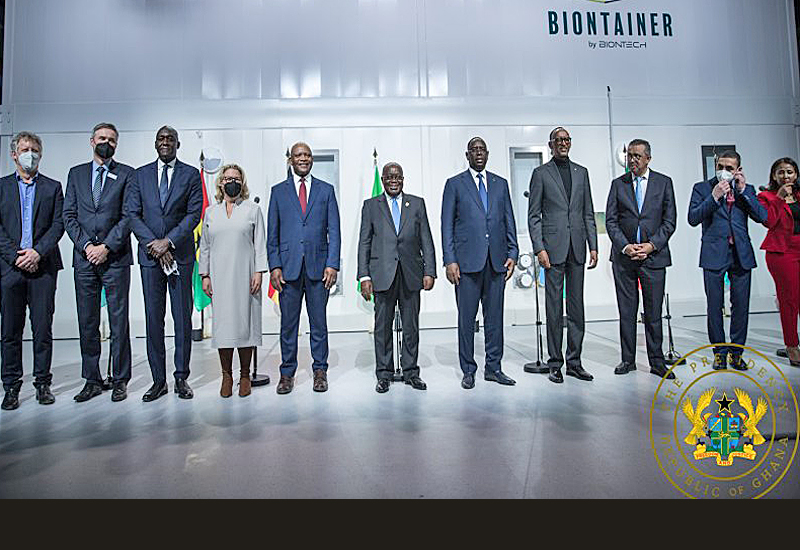Ghana, Rwanda and Senegal are partnering with German biotechnology company, BioNTech SE, to fill, finish, and package BioNTech mRNA vaccines in Africa.
This is a first step in the drive for the production of coronavirus vaccines in Africa to improve supply on the continent.
The announcement was made on Wednesday at a high-level meeting in Marburg, Germany, where President Nana Addo Dankwa Akufo-Addo, together with Presidents Macky Sall of Senegal and Paul Kagame of Rwanda witnessed the unveiling of BioNtech’s modular production facility solution for the production of mRNA vaccines in Africa.
The event was also attended President Ursula von der Leyen of the European Commission, and Tedros Adhanom Ghebreyesus, Director General of the World Health Organization.
The three Presidents jointly discussed with BioNTech’s top-level management the infrastructural, regulatory and technological requirements to establish an end-to-end manufacturing network for mRNA-based vaccines in Africa.
Biontech SE plans to produce its novel mRNA vaccine in modular container-based production facilities named “BioNTainer” to drive the production of coronavirus vaccine in Africa.
The “BioNTainer”, will consist of two modules, each comprising six containers.
They are clean rooms which BioNTech equips with state-of-the-art semi-automated manufacturing solutions.
Each module requires 800 sqm of space and offers an estimated capacity of several hundred of million doses of mRNA-based vaccines depending on the specific vaccine.
Biontech says they will have the capacity to produce up to 50 million doses of the Pfizer/Biontech coronavirus vaccine per year. They will be equipped to manufacture a range of mRNA-based approved or authorized vaccines targeted to the needs of people in African Union member states, like BioNTech’s COVID-19 vaccine, and its malaria and tuberculosis vaccines, if they are successfully developed and approved.
The first BioNTainer is expected to be shipped to the African Union in mid-2022. BioNTech expects to ship BioNTainers to Rwanda and Senegal in close alignment with the respective country and the African Union. BioNTech will be responsible for the delivery and set-up of the modules, while local authorities and governments will ensure the needed infrastructure.
Ghana will support the manufacturing with fill-and-finish capacities. In cooperation with WHO, Africa CDC/AMA, and the European Union, BioNTech is supporting, identifying and setting up the necessary regulatory framework.
BioNTech will initially staff, own and operate the facilities to support the safe and rapid initiation of the production of mRNA-based vaccine doses. In the longer term the company plans to transfer manufacturing capacities and the know-how to local partners to enable sustainable production of mRNA vaccines in Africa. Vaccines manufactured in these facilities are expected to be dedicated to domestic use and export to other member states of the African Union at a
Speaking at the event, President Akufo-Addo said the development was significant to Africa because it heralded an important step in end-to-end vaccine manufacturing to meet future national, regional and continental health security needs.
“This pan-African project fits very well into Ghana’s roadmap for vaccine development and manufacturing, developed by the Vaccine Manufacturing Committee, which I constituted nearly a year ago,” he said.
“We are willing to work together with our counterparts in Rwanda and Senegal to fill, finish, and package BioNTech mRNA vaccines, as a first step in the chain of domestic vaccine production.”
The President told the gathering that Ghana’s Food and Drugs Authority (FDA), the principal Ghanaian regulatory agency, which is currently at WHO Maturity Level 3, and being upgraded to Maturity Level 4, will be readily available to work closely with regulatory bodies from the two partner countries, to enhance the regulatory capacities for domestic vaccine development and manufacturing in Africa.
He said Ghana was ready for the project owing to its growing pharmaceutical industry, which already has broad footprints in West Africa, backed by the nation’s industrious research institutions, strong political will and commitment, and fueled by lessons learned from the COVID-19 pandemic.
“We have gleaned a lot from this pandemic, and we are determined to enhance our ability to handle more efficiently any future outbreaks, including building domestic capacity for vaccine production. We are ready to contribute and to be part of the manufacturing of mRNA COVID-19, Malaria and TB vaccines from drug substance through drug product to Fill, Finish and Package. Ghana is raring to go,” he added.
Ashantibiz




